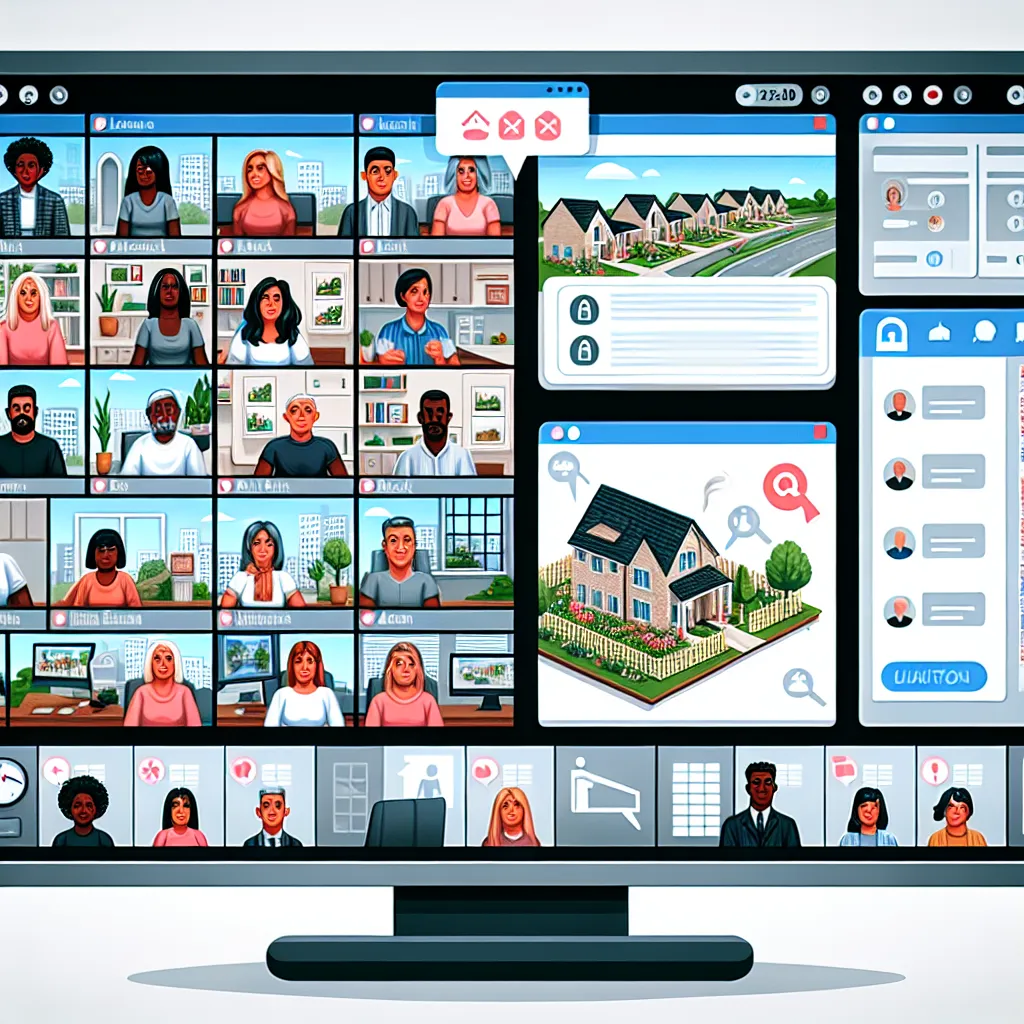The IELTS Speaking test often includes topics related to cross-cultural communication, especially in our increasingly connected digital world. One such topic that has gained prominence is describing experiences of navigating cultural differences online. This article will guide you through how to approach this topic effectively in your IELTS Speaking test, with sample answers and analysis to help you achieve a high band score.
Nội dung bài viết
Understanding the Topic
Navigating cultural differences online refers to situations where you encounter and manage cultural disparities while interacting with people from different backgrounds through digital platforms. This could involve social media interactions, online collaborations, or virtual events. Examiners are looking for your ability to articulate your experiences clearly, showcase your cultural awareness, and demonstrate your language skills in describing complex situations.
 Navigating Cultural Differences Online
Navigating Cultural Differences Online
Part 1: Introduction and Interview
In this section, the examiner may ask general questions about your online experiences and cultural interactions. Here are some potential questions:
- Do you often interact with people from different cultures online?
- What social media platforms do you use to connect with people internationally?
- Have you ever participated in an online cultural exchange program?
Let’s look at a sample answer for the first question:
Sample Answer (Band 7-8):
“Yes, I frequently interact with people from diverse cultural backgrounds online. As an active user of social media platforms like Instagram and Twitter, I often engage in conversations with individuals from various countries. These interactions have been incredibly enlightening, allowing me to gain insights into different cultural perspectives and traditions.”
Analysis: This answer demonstrates a good command of vocabulary with phrases like “engage in conversations” and “gain insights.” The candidate shows enthusiasm and a positive attitude towards cross-cultural interactions, which is favorable.
Part 2: Long Turn (Cue Card)
Here’s a potential cue card related to the topic:
Describe a time when you had to navigate a cultural difference online.
You should say:
- What the situation was
- Who you were interacting with
- What cultural difference you encountered
- How you managed the situation
Sample Answer (Band 7-8):
“I’d like to talk about a time when I had to navigate a cultural difference online during a virtual group project for an international course I was taking. We were a team of five students from different countries, including myself from Vietnam, two students from India, one from Brazil, and another from Germany.
The cultural difference I encountered was related to communication styles. I noticed that my Indian teammates were very direct and assertive in their opinions, which initially made me feel uncomfortable as in Vietnamese culture, we tend to be more indirect and prioritize harmony. On the other hand, the Brazilian student was very expressive and used a lot of emoticons, which some team members found unprofessional.
To manage the situation, I decided to take the initiative and have an open discussion about our different communication styles. I suggested we have a video call where we could discuss our cultural backgrounds and how they influence our communication. During the call, I shared insights about Vietnamese communication norms and listened attentively to others explain their cultural perspectives.
This approach proved to be highly effective. We all gained a better understanding of each other’s cultures and agreed on a middle ground for our project communication. We decided to be clear and direct with our ideas but also mindful of tone. We also agreed that emoticons were okay in casual chats but not in formal project documents.
This experience was incredibly valuable as it taught me the importance of open dialogue and flexibility when working in multicultural teams online. It also enhanced my intercultural communication skills, which I believe are crucial in today’s globalized world.”
Analysis: This answer demonstrates a range of vocabulary related to communication and culture. The candidate structures the response well, addressing all points in the cue card. They show the ability to describe the situation, explain the cultural difference, and articulate how they resolved it, which are all key aspects examiners look for.
Examiner’s Follow-up Questions:
- How did this experience change your approach to online multicultural interactions?
- What advice would you give to someone facing a similar situation?
Sample Answer for Question 1 (Band 8-9):
“This experience was truly eye-opening and has significantly impacted my approach to online multicultural interactions. Firstly, it has made me much more proactive in seeking to understand different cultural norms before engaging in collaborative projects. I now make a conscious effort to research the cultural backgrounds of my team members and anticipate potential differences that might arise.
Moreover, I’ve become more adept at recognizing subtle cultural cues in online communication, such as differences in directness, use of humor, or formality levels. This awareness allows me to adapt my communication style more effectively and foster a more inclusive environment.
Perhaps most importantly, this experience has reinforced the value of open dialogue about cultural differences. I now make it a point to initiate conversations about cultural expectations and working styles at the beginning of any multicultural collaboration. This proactive approach has consistently led to smoother interactions and more productive outcomes in my subsequent online engagements.”
Analysis: This answer demonstrates a high level of reflection and articulation. The candidate shows how the experience has led to concrete changes in their behavior and thinking, which is exactly what examiners are looking for in high-band responses.
Part 3: Two-way Discussion
In this section, the examiner will ask more abstract questions related to the topic. Here are some potential questions and sample answers:
Examiner: How do you think technology has influenced cross-cultural communication?
Sample Answer (Band 8-9):
“Technology has revolutionized cross-cultural communication in numerous ways. Firstly, it has drastically reduced the barriers of distance and time, enabling real-time communication between people from different parts of the world. This has facilitated a level of cultural exchange that was previously unimaginable.
Moreover, social media platforms and online forums have created virtual spaces where people from diverse cultural backgrounds can interact, share ideas, and engage in discussions. This has led to increased cultural awareness and understanding on a global scale.
However, it’s important to note that technology has also introduced new challenges. The lack of non-verbal cues in online communication can sometimes lead to misunderstandings, especially when people from high-context and low-context cultures interact. Additionally, the instantaneous nature of online communication might not always allow for the reflection time needed to navigate complex cultural differences.
On balance, though, I believe technology has been a net positive for cross-cultural communication. It has opened up opportunities for people to learn about and appreciate different cultures, fostering a more interconnected and understanding global community. The key lies in using these technological tools mindfully and coupling them with efforts to develop intercultural competence.”
Analysis: This answer demonstrates a sophisticated understanding of the topic, balancing both positive and negative aspects. The candidate uses a range of complex vocabulary and structures, showing the ability to discuss abstract concepts – a key requirement for achieving high band scores in Part 3.
Key Vocabulary and Phrases for High Scores
To achieve a high band score, it’s crucial to use a range of vocabulary and complex structures. Here are some key terms and phrases related to this topic:
-
Cultural nuances /ˈkʌltʃərəl ˈnjuːɑːnsɪz/ – subtle differences in cultural norms or behaviors
Example: “Understanding cultural nuances is crucial for effective online communication.” -
Intercultural competence /ˌɪntəˈkʌltʃərəl ˈkɒmpɪtəns/ – the ability to communicate effectively with people from different cultures
Example: “Developing intercultural competence is essential in today’s globalized world.” -
Cultural faux pas /ˌkʌltʃərəl fəʊ ˈpɑː/ – an embarrassing mistake made in a social situation due to cultural misunderstanding
Example: “I was careful to avoid any cultural faux pas during the online meeting.” -
Cultural sensitivity /ˈkʌltʃərəl ˌsensəˈtɪvəti/ – awareness and respect for cultural differences
Example: “The project’s success was largely due to our team’s high level of cultural sensitivity.” -
Cross-cultural dialogue /krɒs ˈkʌltʃərəl ˈdaɪəlɒɡ/ – communication between people from different cultural backgrounds
Example: “The online forum promoted cross-cultural dialogue on various global issues.”
Examiner’s Advice
To excel in the IELTS Speaking test, particularly on topics related to cultural differences online:
-
Develop your vocabulary: Familiarize yourself with terms related to culture, communication, and technology.
-
Practice describing experiences: Reflect on your own experiences with cultural differences online and practice articulating them clearly.
-
Stay informed: Keep up with current trends in online communication and cultural exchanges.
-
Work on fluency: Practice speaking on this topic without long pauses. It’s okay to use fillers like “well” or “you see” occasionally to give yourself time to think.
-
Show cultural awareness: Demonstrate your understanding of different cultural perspectives and your ability to adapt to them.
-
Use examples: Concrete examples make your answers more vivid and convincing.
-
Reflect on implications: In Part 3, try to discuss broader implications of cultural differences in online communication.
By following these tips and using the sample answers as inspiration, you’ll be well-prepared to tackle questions about navigating cultural differences online in your IELTS Speaking test. Remember, the key is to demonstrate your language skills while showing thoughtful engagement with the topic.
For more insights on related topics, you might find our articles on describing a virtual cultural event and cultural diversity in education helpful in broadening your perspective on cross-cultural communication.


